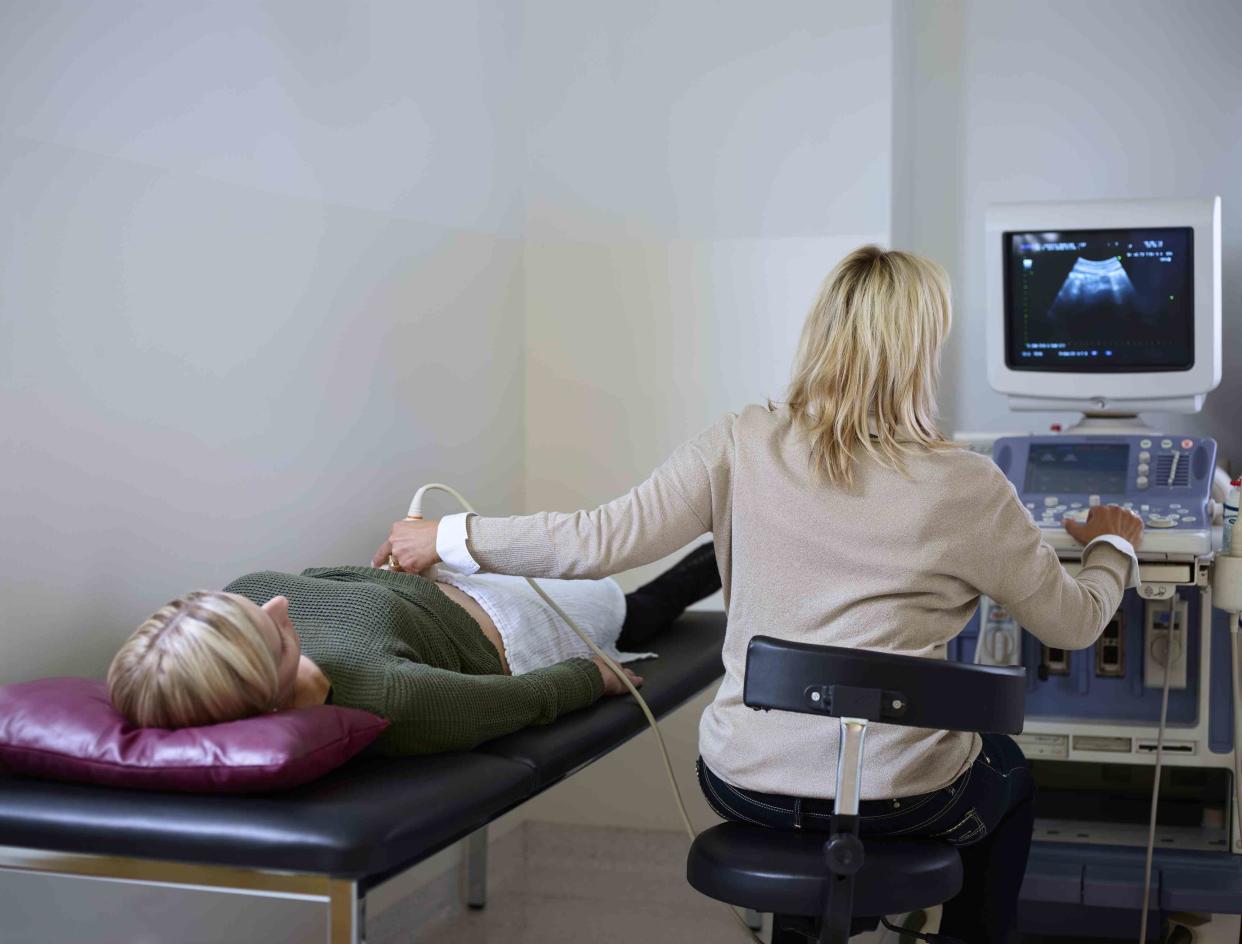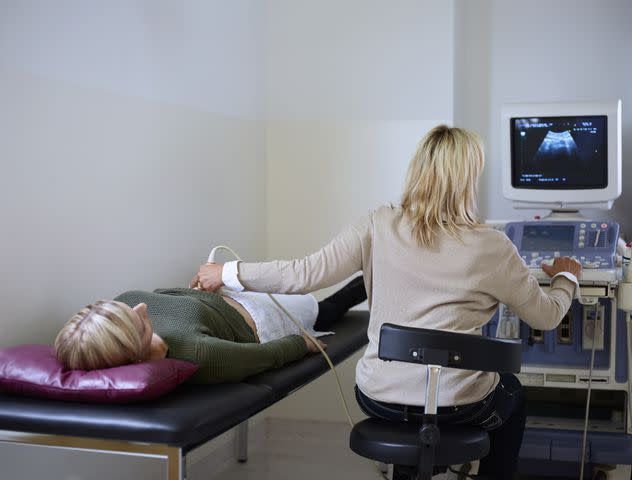When Pain Could Mean Ectopic Pregnancy

Westend61 / Getty Images
Medically reviewed by Cordelia Nwankwo, MD
An ectopic pregnancy develops outside the uterus and happens in about 1 out of every 50 pregnancies in the United States. It is also called tubal pregnancy, occurring in a fallopian tube when a fertilized egg traveling to the uterus gets stuck due to a blockage (such as from scarring) and then attaches to the tube.
Although rare, ectopic pregnancies can also occur in the cervix, ovary, or abdomen. Because an embryo cannot grow and develop outside the uterus, an ectopic pregnancy always ends in pregnancy loss. Without treatment, an ectopic pregnancy can rupture and cause severe complications or death in the mother.
This article discusses the symptoms, diagnosis, treatments, and risk factors of ectopic pregnancies.

Westend61 / Getty Images
Symptoms of Ectopic Pregnancy Pain: Unruptured and Ruptured
Symptoms of ectopic pregnancy typically develop between weeks four and 12 of pregnancy. Early on, ectopic pregnancies can have the same symptoms as normal pregnancies, such as a missed period, breast tenderness, fatigue, and nausea.
Symptoms of an unruptured ectopic pregnancy include:
Vaginal bleeding different from your regular period
Pain in the pelvic area, often only on one side
Discomfort when urinating or having a bowel movement
If an ectopic pregnancy grows and isn’t treated, it can eventually lead to more serious symptoms, including a burst fallopian tube, which can lead to severe internal bleeding. A ruptured ectopic pregnancy is a medical emergency. Signs of a ruptured ectopic pregnancy include:
Sudden, severe pain in the abdomen or pelvis
Shoulder pain
Weakness, dizziness, or fainting
Heavy vaginal bleeding
Takeaway
If you have any symptoms of an ectopic pregnancy, contact a healthcare provider immediately. A ruptured ectopic pregnancy is a life-threatening medical emergency. If you have signs of a ruptured ectopic pregnancy, call 911 or go to an emergency room.
In What Week Could Ectopic Pregnancy Occur?
Symptoms of ectopic pregnancy usually occur between the first and third months of pregnancy, but not all ectopic pregnancies have immediate symptoms. Ectopic pregnancies can be diagnosed based on a positive pregnancy test, medical history, physical exam, and ultrasound to see where the embryo develops.
A blood test is also usually given to measure levels of the pregnancy hormone human chorionic gonadotropin (hCG), which may be lower in an ectopic pregnancy than in a typical one.
Takeaway
While any person can have an ectopic pregnancy, the risk is higher if you:
Are older than 35
Smoke
Have multiple sex partners
Had a previous ectopic pregnancy
Had surgery on a fallopian tube or in the pelvic area
Have endometriosis
Treatment for Unruptured Ectopic Pregnancy
An ectopic pregnancy cannot be moved to the uterus and will always require treatment to remove the pregnancy before it grows too large and endangers the mother's life.
In some cases, treatments such as the following that do not require surgery might be an option.
Expectant Management
Sometimes, your healthcare provider may choose to wait and closely monitor the pregnancy to see if it ends naturally without the need for drugs or surgery. Research shows that up to half of pregnant people with dropping hCG levels will have pregnancies that end on their own.
Methotrexate
Methotrexate is a drug given by injection that stops the embryo’s cells from growing, causing the pregnancy to end. It is the most common drug given to treat ectopic pregnancies. Methotrexate is only an option if the fallopian tube hasn’t burst and hCG levels can continue to be monitored.
Surgical Treatment for Ruptured Ectopic Pregnancy
Surgery is the best option in some cases to remove the ectopic pregnancy, even if the fallopian tube hasn’t ruptured. Surgery is usually done laparoscopically, which entails making small incisions in the abdomen while the patient is under general anesthesia. The surgery might remove the ectopic pregnancy from the fallopian tube or the entire tube with the pregnancy.
If the fallopian tube ruptures, surgery may require a larger abdominal incision (laparotomy) to stop the bleeding and repair damage.
Ectopic Pregnancy After Hysterectomy
Although ectopic pregnancy can occur after a hysterectomy, it is rare, with only 72 cases reported worldwide between 1895 and 2015. However, the number has risen in recent years due to more hysterectomies that remove the uterus while leaving the cervix intact. If you have had a hysterectomy but still have your ovaries, you should be evaluated for ectopic pregnancy if you have symptoms.
After an Ectopic Pregnancy
If you’ve had an ectopic pregnancy, giving your body time to heal is important. Discuss any symptoms and what to expect during recovery with your healthcare provider. Ectopic pregnancy is a pregnancy loss, and you might have feelings of sadness or grief similar to a miscarriage or any other type of lost pregnancy. If you are having trouble coping, talk to your healthcare provider and seek resources for support.
Although many people who have had ectopic pregnancies go on to have healthy pregnancies later on, having had an ectopic pregnancy puts you at higher risk for another one in the future. If you become pregnant again, you must be aware of any signs or symptoms of ectopic pregnancy and have your healthcare provider carefully monitor it.
Summary
An ectopic pregnancy occurs when a fertilized egg attaches to a fallopian tube (or, in rare cases, elsewhere in the body) as it travels to the uterus. This happens due to a blockage in the fallopian tube due to scarring or other conditions. Because embryos can’t grow outside of the uterus, ectopic pregnancies always result in pregnancy loss.
Ectopic pregnancies can have serious complications, especially if a rupture occurs. They always require treatment. Treatments include nonsurgical and surgical options. Anyone experiencing symptoms of ectopic pregnancy should seek medical help immediately.

